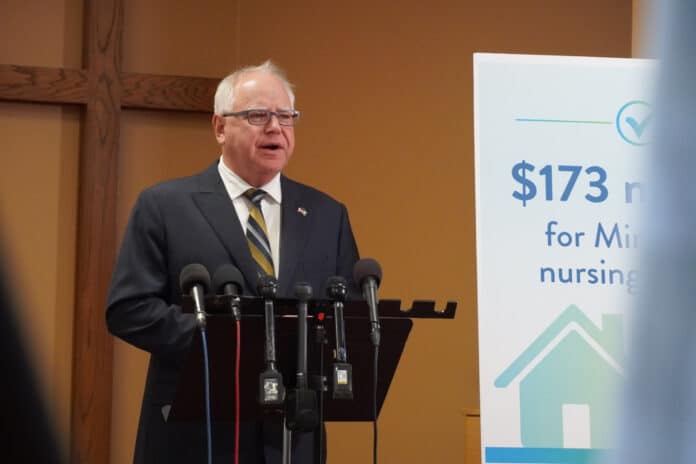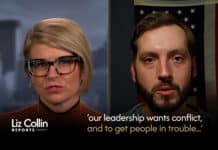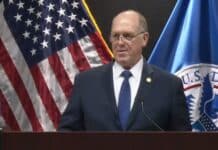
Gov. Tim Walz won’t call a special session to make changes to the new adult-use recreational marijuana law to fix loopholes Republicans allege effectively decriminalize use for minors.
Walz told reporters gathered for a press conference Tuesday that it’s clear to him it’s still illegal for minors to use marijuana products. He said he won’t be calling a special session at the request of House Republicans, but said he expects that legislators may choose to tweak the new laws during the 2024 regular legislative session.
Those comments came despite repeated requests House Republicans have made over the last two weeks, including one on Monday, to the governor to call a special session to fix what they say are “dangerous gaps, contradictions, and loopholes” in the new legalization laws that went into effect on Aug. 1.
“Like any piece of legislation, will there be things that will be changed?” Walz rhetorically asked members of the media in Coon Rapids during an event he held to tout legislative accomplishments related to state funding to address the senior housing shortages. “My God, we are changing the alcohol laws 120 years after the fact.”
Reporters peppered Walz with questions about the new recreational marijuana law at the tail end of his press conference. This came after Rep. Peggy Scott, R-Andover, sent a second letter on Monday to request the governor call a special session.
“We are disappointed in your unwillingness to address glaring defects in the 2023 Marijuana Legalization law,” Assistant Majority Leader Scott wrote in the Aug. 7 letter she sent to Walz and DFL leaders in the House and Senate.
The letter alleges the new laws “significantly reduced the penalties for selling drugs to minors,” contrary to claims by DFL bill sponsors in the House, Scott wrote. More than two dozen other Republican members of the House signed onto the letter, a follow-up to Scott’s July 28 letter to the governor, Speaker of the House Melissa Hortman and Senate Majority Leader Kari Dziedzic.
“In the days since our initial letter, it has become clearer that Minnesota Democrats still do not understand the full implications of the new law — particularly when it comes to keeping kids away from drugs,” Scott wrote.
“The previous punishment for the illegal sale of marijuana to a person under 18 years of age was up to 20 years imprisonment and a penalty of up to $250,000,” Scott continued. “The new penalties for illegal sale, including to a minor, range from up to one to five years of imprisonment and a penalty of up to $3,000 to $10,000 depending on the age disparity between the seller and buyer.”
Walz says Republicans spreading ‘false information’ about new weed law
Reporters at the Tuesday press conference asked Walz several questions about the legitimacy of the claims made in Scott’s two letters. Walz’s answer: Republicans are spreading misinformation.
“The bottom line on this is those that are screaming or making up false information simply had no plan to address any of those issues,” Walz said, in reference to Republicans claims the new laws effectively decriminalize use of marijuana by minors. “My position was always that I trust Minnesotans as adults to make decisions based on this when things are put into law.”
In the Aug. 7 letter Scott says that the legislation contains three other loopholes that need to be addressed in a special session. She says the new law:
- enables criminals who exploit minors,
- lets negligent adults off the hook when they would otherwise be legally culpable in certain instances when minors smoke marijuana on their property,
- and makes it easier to get away with driving while under the influence of cannabis.
The initial request from Scott and nearly 30 of her fellow GOP colleagues to Walz to call a special session came just a few days before the recreational marijuana legislation went into effect. In the days leading up to legalization, Republicans say they discovered loopholes that fail to protect minors.
In response to those initial charges, Democrats had said HF100 intended to decriminalize marijuana use and possession of small amounts for all people, including minors.
“What we learned getting ready for this bill and talking to folks in other states is that prohibition doesn’t work,” Sen. Lindsey Port, DFL-Burnsville, told MinnPost in a late July story on the issue. “The best way to get young people to use cannabis less is to use real money to educate them in ways that they can hear, which means peer to peer programming, and having a legal market where you have to be 21 to buy and you have to go to a dispensary to buy it.”
At the Tuesday press conference Walz downplayed Port’s comments.
“The intent of the authors will always be there,” he said. “The interpretation and the operationalizing of this (new law as it relates to penalties for minor consumption) will be with our agencies. And there is no intention of taking that away from minors. It’s simply illegal for them to use it; and we will get information out there and make sure they know that.”
But Republicans who signed onto Scott’s letter disagree. If left the way it is, Republicans in the House say the new legalization law allows adults to “exploit minors or act in a negligent manner toward minor intoxication.”
“Reinstating serious penalties will show that our state takes underage consumption seriously and does not tolerate the exploitation of young people for illegal drug trafficking,” Scott wrote.
Hank Long
Hank Long is a journalism and communications professional whose writing career includes coverage of the Minnesota legislature, city and county governments and the commercial real estate industry. Hank received his undergraduate degree at the University of Minnesota, where he studied journalism, and his law degree at the University of St. Thomas. The Minnesota native lives in the Twin Cities with his wife and four children. His dream is to be around when the Vikings win the Super Bowl.











